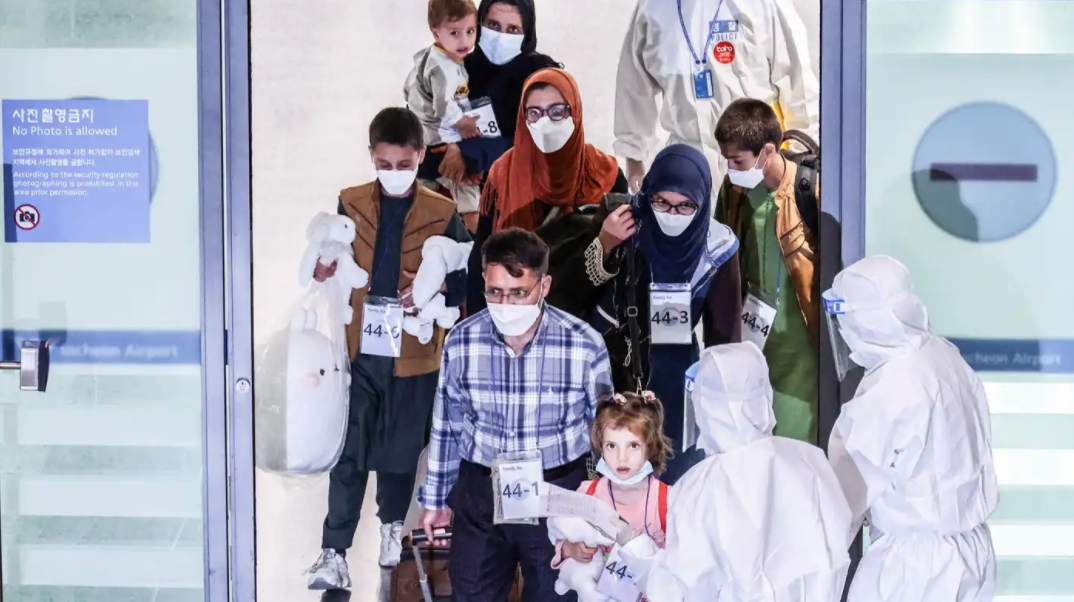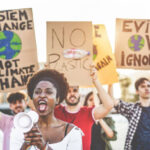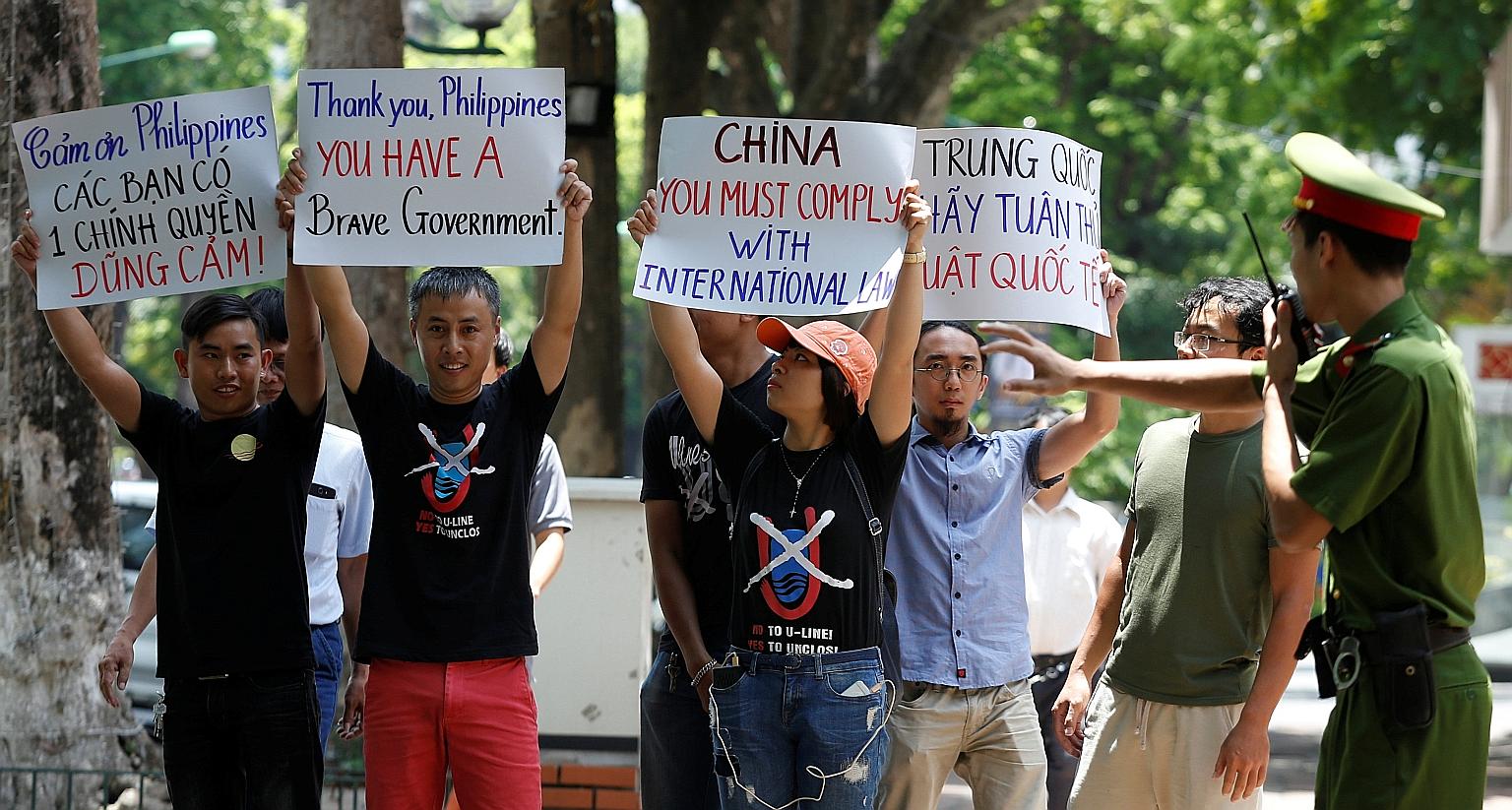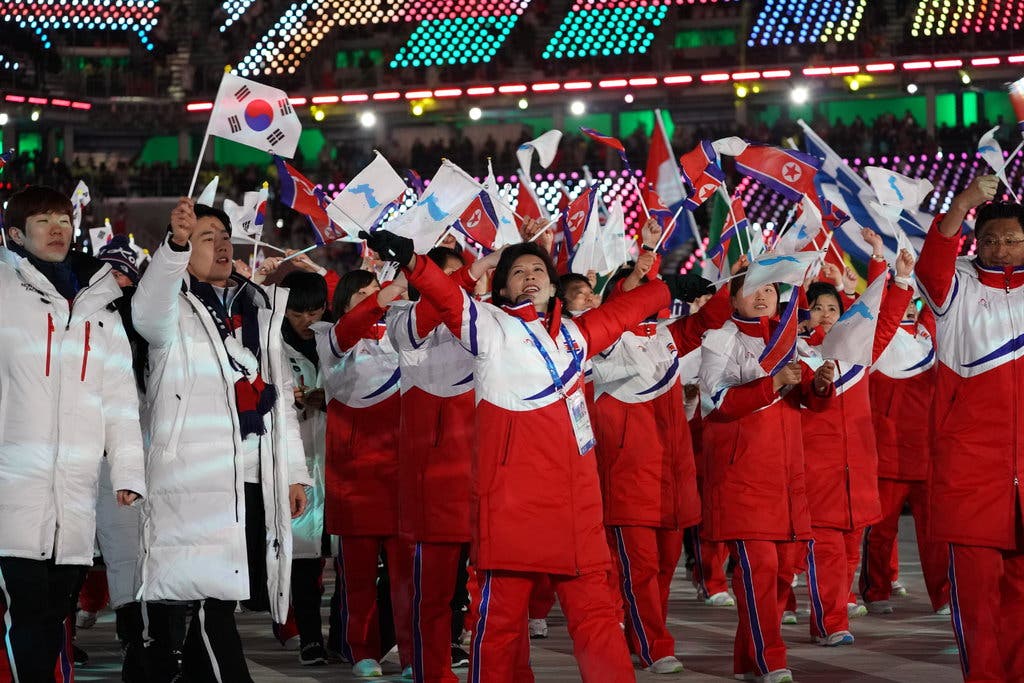On August 26, nearly 400 hopeful Afghan refugees landed at the Incheon International Airport following the crisis in the wake of the U.S. military withdrawal and the Taliban takeover. Through an evacuation strategy dubbed as “Operation Miracle,” a majority of the people who arrived in Korea were professionals in the fields of medicine, education, and I.T., or had worked with the South Korean embassy and the Korea International Cooperation Agency (KOICA). Following their arrival, South Korea seemed to be extremely welcoming and showed extensive support towards the refugees, with the President stating that it was “only natural for us to fulfill our moral responsibility,” the Justice Minister referring to them as “our Afghan friends,” and the government even designating them as “persons of special merit” rather than giving them refugee titles. However, it should be noted that never once was the contemplation of accepting refugees “natural” or an exchange between “friends.” Such courteous acts are considered to be overwhelming and surprising for a country like South Korea, where many pride themselves in ethnic homogeneity and immigration is an extremely vexed issue. Subsequently, while many would assume that the controversy of the refugee issue has died down throughout the years and that South Korea has chosen to take a much more charitable defense, this is only a deception on the surface of the matter. Fundamentally, the Afghan crisis is still an appendage to South Korea’s rigid and almost nonexistent refugee acceptance.
A History Contrasting Present Affairs
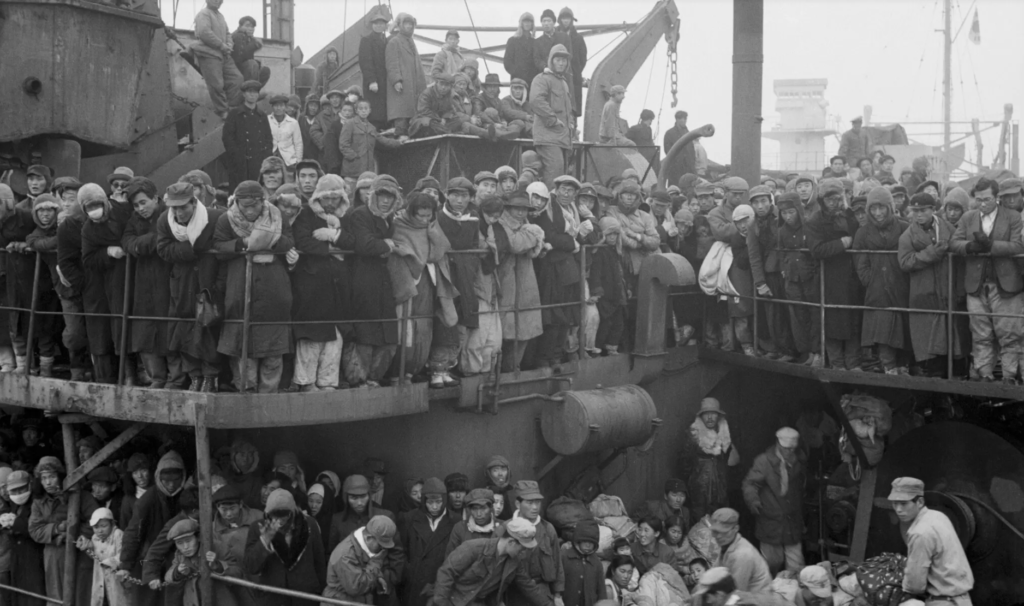
Source: The New York Times
When the Korean War broke out in 1950, around 91,000 refugees evacuated Hungnam, a North Korean port. This frantic retreat from the Chinese Communist troops is considered to be the largest wartime refugee evacuation from land by a single ship in American history, until the Afghanistan crisis came into the picture. During this desperate time, civilians turned into refugees overnight as they crammed themselves into Meredith Victory, the last ship leaving the port that was headed to Busan and Geoje Island. These refugees, including the parents of the current South Korean President, were saved by the U.S. soldiers who “listened to their better angels” despite having received orders from their colonel “not to rescue civilians” as “the military comes first.” Although these evacuees safely relocated and resettled into the South, both the South and the North were left with many orphans as a result of the war, with an approximate number of 160,000 of whom were sent to the South’s Cold War allies in North America, Western Europe, and Australia as international adoptees. The international community by and large, specifically the U.S, the U.K., and Germany, communally provided financial support, assistance programs, combat operations, and troop deployment during this period.
In remembrance of this occurrence, Yang-young Sohn, 70 years old, remarked that watching the recent crisis in Afghanistan, where mothers were holding onto their babies and begging to board the airplanes in Kabul, reminded him of his own experience of a similar traumatic wartime period. Mr. Sohn, one of the five babies born on the ship, stated that watching the news that depicted a young Afghan soccer player falling off the American plane made him recall the pain of war-torn Korean families. Another baby born on Meredith Victory, Kweng-pil Lee, stated that “The Americans were our savior,” and that once his family resettled themselves, they named the photo studio and grocery store that they set up after “Peace” as they didn’t want to be involved in another war.
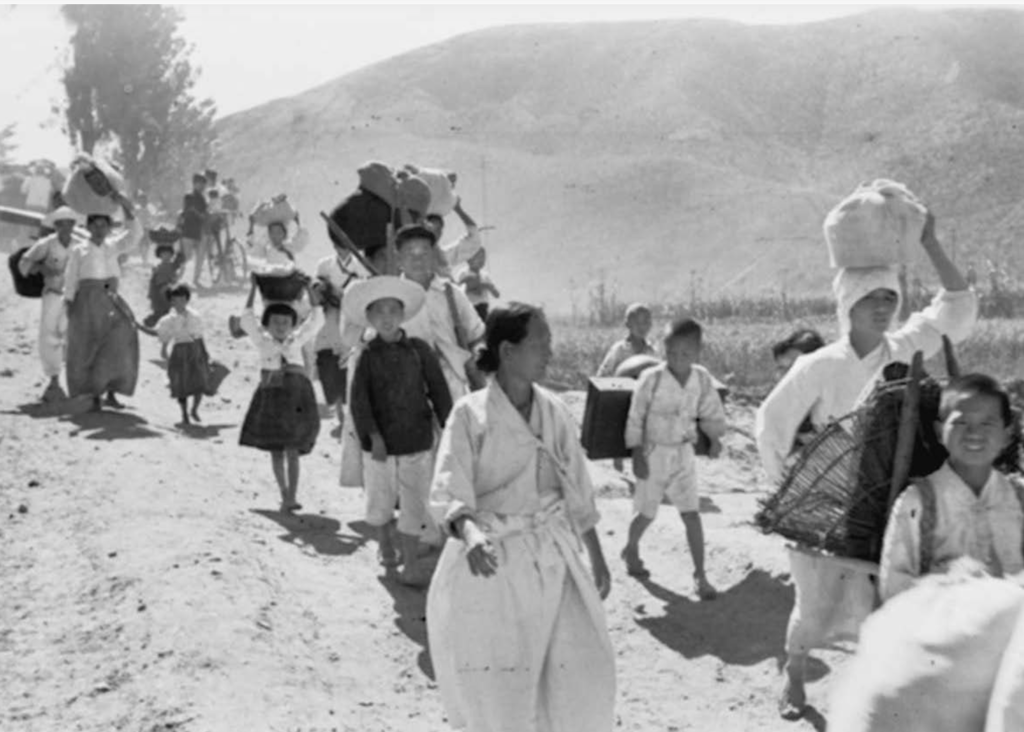
Source: Australian War Memorial Website
Despite such a history, Korea has erased any traces of this historical indebtedness and no longer relates to the ordeals of the refugees despite having been in their shoes themselves. This is predominantly evident in the country’s refugee policies and the society’s climate of opinion.
Rule of Law
Although South Korea was the first East Asian country that officially legislated the Refugee Act in 2013 and adopted the 1951 United Nations Refugee Convention in 1992, written law and statistics prove that this portrayal isn’t a clear representation of South Korea’s reality. Article 19 of South Korea’s Refugee Act states, “…the Minister of Justice may decide not to recognize an applicant as a refugee, even when the refugee status applicant qualifies for refugee status.” Moreover, according to the Ministry of Justice, around 12,208 asylum applicants have registered to receive refugee protection since 1992 but only 522 (4.2%) were accepted.
In light of this, Darwish Musab, 28, has spoken out to the Korea Times in opposition of South Korea’s harsh and discriminatory refugee approval, declaring that the process in itself is not only unfair but that decisions are made without thorough revision. He stated, “During the whole process, they (Seoul Immigration Office) didn’t even look at my evidence – hundreds of documents and videos – of the political persecution I faced in my home country. And the interview documents were full of mistranslation and fabrications.”
While the process of seeking refugee status is complicated, the process of obtaining permanent residency in South Korea is all the more strenuous. According to the Immigration Act, those seeking permanent residency should meet requirements pertaining to financial ability, Korean language fluency, and an understanding of Korean history and culture. However, the Justice Minister holds the authority to waive such requirements for people who have provided distinguished service to South Korea.
Hypothetically and on paper, South Korea has projected a rather favorable response to humanitarian efforts towards the acceptance of refugees but as observed in its unbending laws and unabating low acceptance rates, its reality is at odds with this reputation.
Fight or Flight?
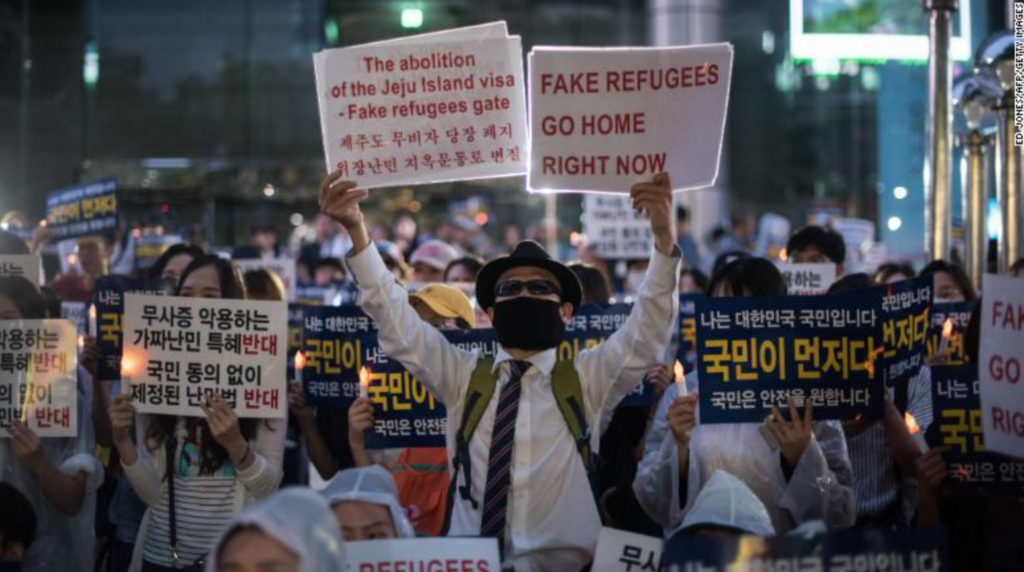 When debating upon the refugee issue as a whole and the South Koreans’ opinions on Afghan refugees in part, it is important to bring into question how South Korea reacted to the Yemen refugees three years ago. South Korea experienced its first serious encounter concerning a global refugee crisis when approximately 500 Yemeni asylum seekers reached Jeju Island between January and May of 2018. The public sentiment towards these refugees was predominately and unequivocally negative, which resulted in politicians and policymakers eventually dismissing the issue as one that “needs further public consensus” and refused to upset the strong opposition of the citizens by leaving the issue to die down.
When debating upon the refugee issue as a whole and the South Koreans’ opinions on Afghan refugees in part, it is important to bring into question how South Korea reacted to the Yemen refugees three years ago. South Korea experienced its first serious encounter concerning a global refugee crisis when approximately 500 Yemeni asylum seekers reached Jeju Island between January and May of 2018. The public sentiment towards these refugees was predominately and unequivocally negative, which resulted in politicians and policymakers eventually dismissing the issue as one that “needs further public consensus” and refused to upset the strong opposition of the citizens by leaving the issue to die down.
Although a divided stance in response to the Afghan refugees is still notable, such a reaction is markedly positive when compared to that observed three years ago. Comparably, Afghan refugees were far more welcomed by society and better tended to by the government despite the fact that they share the same status as the Yemen refugees. For instance, the Korea Communications Commission offered to use media content to help the Afghans adapt to Korean society, related ministries have launched a social adaptation program to offer employment education for proactive independence and integration of the refugees, and young students have even organized a winter clothing donation drive to provide winter clothes as Afghans come from a warmer region.
An explanation for this favorable reaction heavily lies in the process of how the refugees of both parties were brought into South Korea. Although the Yemenis were seeking protection at the time a civil war broke out in their nation, they didn’t arrive in Jeju Island with the request of a refugee status. In fact, no Yemenis applied for refugee status in the first year of their stay and relied on the visa-waiver program of Jeju for months. This instigated the impression of the Yemenis being “fake refugees.” Anti-refugee protests were held in the Gwanghwamun area and petitions were posted on the Blue House website arguing for the expulsion of the Yemeni refugees. One demonstrator named Christopher Han stated, “They came here without a proper legal process…the reality is that we have been used by them,” and more than 700,000 South Koreans responded to the petition on the Blue House website.
Contrarily, 66.8% of the respondents were in favor of giving Afghan contributors with previous and current ties to the Korean government visas for prolonged stay and employment, as observed in a recent survey conducted by Realmeter on August 27. More so than the Yemenis, Afghans are better recognized by the South Koreans. They have better chances of applying for permanent residency as they have the title of “people of special merit,” and the evacuees brought to South Korea have “…contributed to the Korean government, so they will get greater care than refugees in terms of living costs, subsidies for settlement and education,” as reported by Justice Minister Park. In which case, “…the status can be seen as a form of preferential treatment for Afghan evacuees,” when compared to the Yemen refugees, as stated by a Seoul-based lawyer wishing to remain anonymous.
On The Road To Change
While the norm of refugees is improving by degrees, facts and statistics prove that South Korea has been walking in circles. The general opposition to the idea of refugees goes against the Segyehwa ideal that South Korea has been promulgating for over 30 years now. Segyehwa refers to the political, cultural, and open-mindedness that South Korea wanted to adopt in order to grow alongside the prosperity of the rest of the world. However, in a survey conducted by Hankook Research in coordination with UNHCR in late November of 2020, approximately 53% were still against the country receiving refugees and this indicates that the nation is far from practicing a political or cultural open-mindedness. On this matter, South Korea should realize that globalization cannot happen with fervent linkages to homogeneity and xenophobia. It is ironic that despite the young age of South Korea’s democracy, the feelings aroused by the idea of togetherness is extreme. On this note, NGOs working to better the lives of refugees should spend more effort in educating and redefining the current norm, rather than educating the refugees on culture and integration. In order to move forward in the path to Segyehwa, citizens should learn to accept that boundaries don’t keep people out but rather fence the nation in. In light of the current Afghan refugee issue, South Korea should overturn a crisis into an opportunity to finally take an affirmative stance and no longer trivialize the problem at hand.
- Not in Education, Employment, and Training - October 7, 2022
- Unification Of The Two Koreas: An Economic Approach - January 26, 2022
- Mission Impossible?: Refugees Seeking The Korean Dream - November 24, 2021

